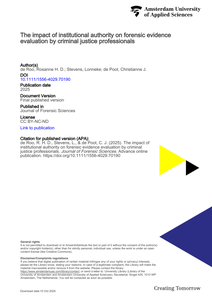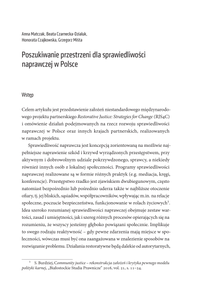This chapter explores the legal and moral implications of the use of data science in criminal justice at two levels: police surveillance and the criminal trial of a defendant. At the first level, police surveillance, data science is used to identify places and people at high risk of criminal activity, allowing police officers to target surveillance and take proactive measures to try to prevent crime (predictive policing). At the second level, the criminal trial of a defendant, data science is used to make risk assessments to support decisions about bail, sentencing, probation, and supervision and detention orders for high-risk offenders. The use of data science at these levels has one thing in common: it is about predicting risk. The uncertainty associated with risk prediction raises specific related legal and ethical dilemmas, for example in the areas of reasonable suspicion, presumption of innocence, privacy, and the principle of non-discrimination.
DOCUMENT
Accurate and reliable decision-making in the criminal justice system depends on accurate expert reporting and on the correct interpretation of evidence by the judges, prosecutors, and defense lawyers. The present study aims to gain insight into the judiciary's capability to assess the accuracy and reliability of forensic expert reports by first examining the extent to which criminal justice professionals are able to differentiate between an accurate (or sound) expert report and an inaccurate (or unsound) expert report. In an online questionnaire, 133 participants assessed both a sound and an unsound expert report. The findings show that, on average, participants were unable to significantly distinguish between sound and unsound forensic expert reports. Second, the study explored the influence of institutional authority on the evaluation of forensic expert reports. Reports that were not recognized as flawed—particularly those originating from well-known and reputable institutions—were subjected to less critical examination, increasing the risk of evaluation errors. These results suggest that the perceived institutional authority influences the assessment of forensic evidence. The study highlights the need for tools to support criminal justice professionals in evaluating forensic evidence, particularly when experts are unregistered. Recommendations include adhering to established quality standards, consulting counter-expert evaluations, improving courtroom communication, and enhancing forensic knowledge through training. Overall, the findings underscore the importance of critical evidence evaluation to reduce the risk of misinterpretation and wrongful convictions in the judicial process.
DOCUMENT

Forensic reports use various types of conclusions, such as a categorical (CAT) conclusion or a likelihood ratio (LR). In order to correctly assess the evidence, users of forensic reports need to understand the conclusion and its evidential strength. The aim of this paper is to study the interpretation of the evidential strength of forensic conclusions by criminal justice professionals. In an online questionnaire 269 professionals assessed 768 reports on fingerprint examination and answered questions that measured self-proclaimed and actual understanding of the reports and conclusions. The reports entailed CAT, verbal LR and numerical LR conclusions with low or high evidential strength and were assessed by crime scene investigators, police detectives, public prosecutors, criminal lawyers, and judges. The results show that about a quarter of all questions measuring actual understanding of the reports were answered incorrectly. The CAT conclusion was best understood for the weak conclusions, the three strong conclusions were all assessed similarly. The weak CAT conclusion correctly emphasizes the uncertainty of any conclusion type used. However, most participants underestimated the strength of this weak CAT conclusion compared to the other weak conclusion types. Looking at the self-proclaimed understanding of all professionals, they in general overestimated their actual understanding of all conclusion types.
DOCUMENT

This critical, literature-review based research project, inspired by the outbreak of the Russia-Ukraine war, examines the limitations and possibilities of restorative justice in a time of war. Any armed conflict creates and amplifies the need for extreme militarisation and securitisation, accompanied by belligerent rhetoric. Thus, for restorative justice scholars and practitioners, the outbreak of war challenges the applicability of restorative justice values and practices, as bipolar interpretations of events, conflicts, and human suffering displace more balanced views. The purpose of our research is to critically discuss the applicability of restorative justice in times of war and in the context of the Russo-Ukrainian War in particular. Our motivation to focus on this specific war and to examine the (im)possibilities of restorative justice from Eurocentric perspective stems from three observations: (1) In the last 20 years restorative justice was continuously promoted in Europe as a new “culture” of justice; (2) The Russo-Ukrainian War currently takes place on the European continent and impacts the European security architecture more than that of other world regions; (3) This war has a particular meaning to the world (e.g., a violent clash between the (former) Cold War superpowers, an element of surprise, the shattered myth of overwhelming Russian military might, the nuclear threat coupled with a global energy crisis etc.).
DOCUMENT

Presentation by Rutger Leukfeldt on Financially motivated cybercriminal networks, during workshop on Cybercrime Offenders. Cybercrime perpetrators are as diverse and complex as the cybercrime that they commit. For example, they come from different backgrounds and have different (egotistical, technical, monetary, ideological, political, professional, vengeful, sexual or other) motivations. They may or may not be professional criminals, and individuals or part of organised groups or networks (example of Advanced Persistent Threats). Some may commit crime on their own account or make their services available to others, and some may be supported by or be state actors. A better understanding of the types of perpetrators and their motivations and techniques can be instrumental for the prevention of cybercrime and for a more effective criminal justice response. The aim of this workshop is to contribute to such a better understanding and to initiate steps towards a typology of offenders.
DOCUMENT

Full text aanvragen via link What makes a juvenile delinquent develop into an adult criminal? What defines-cognitively, developmentally, legally-the transition from juvenile to adult and what determines whether patterns of criminal behavior persist? In most US states and Western nations, legal adulthood begins at age 18. This volume focuses on the period surrounding that abrupt transition (roughly ages 15-29) and addresses what happens to offending careers during it. Edited by two leading authorities in the fields of psychology and criminology, Transitions from Juvenile Delinquency to Adult Crime examines why the period of transition is important and how it can be better understood and addressed both inside and outside of the justice system.
LINK
The past two decades, a disproportionate growth of females entering the criminal justice system and forensic mental health services has been observed worldwide. However, there is a lack of knowledge on the background of women who are convicted for violent offenses. What is their criminal history, what are their motives for offending and in which way do they differ from men convicted for violent offenses? In this study, criminal histories and the offenses for which they were admitted to forensic care were analyzed of 218 women and 218 men who have been treated between 1984 and 2014 with a mandatory treatment order in one of four Dutch forensic psychiatric settings admitting both men and women. It is concluded that there are important differences in violent offending between male and female patients. Most importantly, female violence was more often directed towards their close environment, like their children, and driven by relational frustration. Furthermore, female patients received lower punishments compared to male patients and were more often considered to be diminished accountable for their offenses due to a mental illness.
MULTIFILE

By analysing intelligence-gathering reform legislation this article discusses access to justice for communications interception by the intelligence and security services. In the aftermath of the Snowden revelations, sophisticated oversight systems for bulk communications surveillance are being established across the globe. In the Netherlands prior judicial consent and a binding complaint procedure have been established. However, although checks and balances for targeted communications interference have been created, accountability mechanisms are less equipped to effectively remedy indiscriminate interference. Therefore, within the context of mass communications surveillance programs, access to justice for complainants remains a contentious issue.
MULTIFILE

The aim of this article is to present the objectives of a customised international partnership project Restorative Justice: Strategies for Change (RJS4C) project, and discuss activities undertaken for the development of restorative justice in Poland and other partner countries.
MULTIFILE
